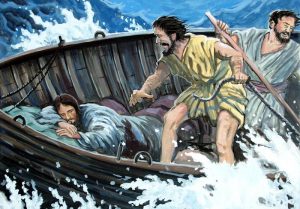Week 13 02
A More Accurate Image of God and Seismic Revelation of Jesus
(Gen 19:15-29; Ps 26; Mt 8:23-27)
**********************************************************
Have you ever heard these comments at funerals, “God took her home,” or “It was God’s will?” Or when growing up, “God’s going to get you for that!”
Today’s readings encourage us to let go of distorted images of God, and put our faith in our God who is compassionate, merciful and deserving of praise and worship, and in Jesus as Son of God and Lord of all creation.
The first reading about the destruction (punishment) of Sodom by sulphur and fire and the rescue of Lot (but not his wife who was turned into a pillar of salt for looking back) is a good example of Old Testament anthropomorphism (the attribution of human traits, emotions, and intentions to non-human entities that is considered to be an innate tendency of human psychology). It is the unfortunate practice of reducing God to our level and attributing to God the behaviour that we would likely do if in a similar situation.
A visit to the city of Pompeii that was suddenly engulfed by an explosion of the volcano Vesuvius and the archaeological finds there is enough to see where this story of the destruction of Sodom as retribution from a punishing vengeful God could easily come from.
Considering that in the ancient world, a violation of the rule of hospitality was considered a more grievous offence than almost any other sin, one can perhaps sympathize with the author of this passage of Genesis in casting this whole incident on the shoulders of a vengeful God dishing out well-deserved punishment.
Scripture scholars, however, point out we cannot really understand or interpret the Old Testament apart from the whole bible (Corpus theory), and especially apart from the New Testament and the Book of Revelation where Jesus, the Lamb of God, holds the keys to the seven scrolls. The implication here is that all the events of the Old Testament, especially the violence that one finds there, can be understood properly only in the light of the teachings of Jesus on mercy and forgiveness, the sacrifice of Jesus’ life on the cross, his resurrection, and the giving of the Holy Spirit who is the agent of forgiveness.
 The gospel gives us a glimpse into the true nature of God, who would send his Son Jesus to be incarnated totally into our human nature, taking on our human condition, symbolized by his sleeping in the boat, for the sole purpose of redeeming us, saving us from our sinfulness, and attracting us back to this God who is love and love alone.
The gospel gives us a glimpse into the true nature of God, who would send his Son Jesus to be incarnated totally into our human nature, taking on our human condition, symbolized by his sleeping in the boat, for the sole purpose of redeeming us, saving us from our sinfulness, and attracting us back to this God who is love and love alone.
The calming of the storm is evidence of his compassion, understanding and power to calm any and all of the storms in our lives, if we would only believe in him and put our complete and total trust in him (far beyond the amazement of the disciples in the boat at this stage of their growth in him).
In its commentary on this gospel, The Word Among Us points out the word Matthew uses to describe the “violent storm” comes from the Greek word seismos meaning earthquake. Matthew uses that word four times in his Gospel, each time revealing a different facet of the identity of Jesus.
In this passage, it reveals Jesus as Lord of all creation. In Matthew 24:7, Jesus describes his Second Coming by saying that earthquakes will precede it as a sign that he is near, and all humankind “will see the Son of Man coming upon the clouds of heaven” (24:30). Here God reveals that Jesus is the powerful Son of Man (Daniel 7:13), the Lord who will reign over all of history.
Matthew’s next reference to an earthquake occurs during Jesus’ passion at his death. In chapter 27, when Jesus gave up his spirit, “the earth quaked, rocks were split, tombs were opened, and the bodies of many saints who had fallen asleep were raised” (27:51-52). This time the revelation comes through the Roman centurion and his men: “When they saw the earthquake, they said, ‘Truly, this was the Son of God!’” (27:54).
Matthew’s final earthquake occurs at Jesus’ resurrection: “There was a great earthquake; for an angel of the Lord descended from heaven, approached, rolled back the stone and sat upon it” (28:2). What is this revelation? Jesus is risen. He is God, sovereign over death itself.
So – Lord over creation. Lord over history. Victor over death. True Son of God. Surely Jesus can help us in our personal “earthquakes”!

1st century boat in Galilee
I experienced that precise power in my life during a retreat before my episcopal ordination, written up in my book Drumming From Within. Waking up on the first day of the retreat, I was suddenly filled with fear, foreboding and dread at what I had gotten myself into. That was like being caught in a storm that threatened to drown me. I ended up praying with this passage, and it turned out to be an hour of praying with my emotions. Thinking of the future, waves of doubt and trepidation surged over me. Then praying with this passage, contrary emotions of peace, confidence and calm would surge up. Back and forth it went for the whole hour, and then suddenly, there was only peace and calm – all fear and anxiety had vanished. I had to pinch myself to make sure it was real, and it was. I could only be grateful for inner healing that was a priceless gift from such a gracious God who would get into my boat and calm my storm.
The Eucharist is our boat for navigating the stormy waters in our lives. The Word of God reaches deep into our spirits with healing balm, and the Body and Blood of Jesus that we receive gives us a taste of eternal life here and now.
May our celebration deepen our faith in our God who is humility, mercy, compassion, forgiveness, unconditional love and above all, totally non-violent. May it empower us to live in harmony with God and in peace with others, as we journey with Jesus in our boats over any troubled waters of our lives.




Well, the readings and teachings mentions today is pretty clear what need to do be his disciples and fellowship of Jesus Christ. We are ask to be image of God by following his teachings and his word throughout our lives. He wants us to let go of the negative thoughts towards God and try to accept God that has unconditional love, humility. mercy , forgiveness and compassion . Basically, he is asking us to see him as someone who has forgiveness and love because he keeps on forgiving us for all sins or faults we did against him. He taught us to forgive one another by telling the person who hurt us how we feel and forgive them. We can express our feelings face to face or write a letter . Also he taught us to love one another as we love ourselves. We are to love our enemies by treating with respect and dignity. So, we can strengthen our faith by living out the word of God and be in peace with others as we join Jesus in our boats even though violent storms . Amen. Praise to you Lord Jesus Christ.
Thanks again for the inspiring words and beautiful messages about joining the seismic Revelation of Jesus Christ. There will always be difficulties and tragedies happening in our lives ; it depends how you deal with it by turning to God. I agree with the teachings and hearing the word of God pretty much everyday. Bishop Sylvain Lavoie. Gracias! Merci!